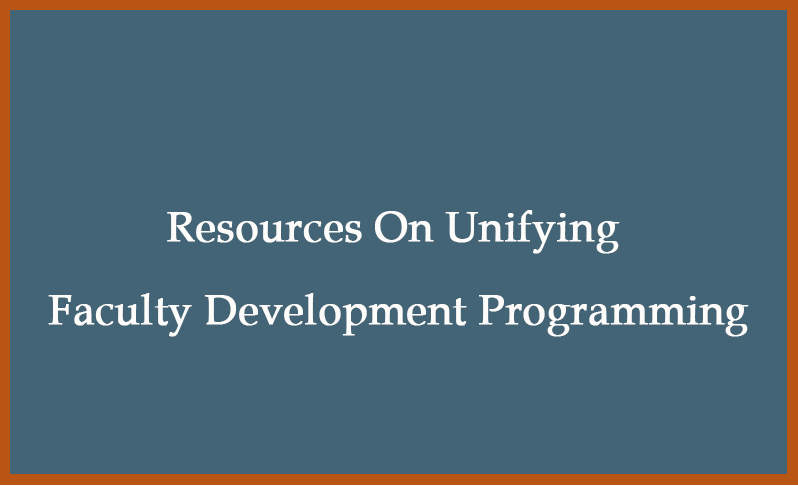A few posts ago we discussed the importance of a center for teaching & learning (CTL) developing unified programming—i.e., a central concern around which it revolves. We even made the comment that “Research demonstrates that isolated one-shot presentations have little effect on the faculty.” For those of you wondering about that research, we have a major source for you, and we have an elaboration beyond the previous suggestion of milestone events for creating unity.
Related Reading: Creating Unified Higher Ed Faculty Development Programming
Key Faculty Development Programming Research
William Condon, Ellen Iverson, Cathryn Manduca, Carol Rutz, and Gudrun Willet recently published Faculty Development and Student Learning: Assessing the Connections (Bloomington: Indiana University Press, 2016) that focuses on developing the golden link between programming offered by CTLs, the faculty absorbing that knowledge, and the resulting increase in student learning. Performing the research at Carleton College and Washington State University, the authors claim, “the research process led to the conclusion that the single workshop is not the correct unit of measure. The ethnographic and interview data clearly show the interaction of multiple workshops over time” (page 58). And the faculty subject concurred with that conclusion: “Faculty professed to like events that had their priorities straight—meaning events that faculty perceived as focused on important aspects of teaching. They tended to dislike events that were required or that they perceived as addressing more trivial topics, such as learning to use the new course management software. Faculty valued initiatives that provided support and that were iterative in nature” (page 127).
Possible Faculty Programming Application
One way to create this unity and iteration is through theming. Each CTL can craft a central motif around which much of the academic year’s faculty development programming can revolve—milestone events, presentations, and communities.
As we have stated previously, much of our early programming, especially in the fall, was really just an extension of New Faculty Orientation (NFO), offering campus shops that had no time to present their services during NFO an opportunity. Thus, the bulk of our programming consisted of giving the Counselling Center, the Office of Services for Individuals with Disabilities, Coo-op Education, and others similar groups an hour.
Related Reading: 14 Guidelines for Successful Higher Ed Faculty Workshops
Our major changeover came this past fall when we offered with our Media Producer to help these shops put their presentations on line where they could be viewed on demand. Our faculty development programming since has followed the unified and iterative model, but, of course, we have to follow the CTL’s prime directive and offer what programming our provost desires. As a result, since the Provost considers metacognition an important tool for student retention and success, we have been so focused the past two years.
This fall, as part of the Provost’s Speaker Series, Saundra McGuire, author of Teach Students How To Learn (2015), provided workshops on metacognitive strategies for both students and faculty. On the faculty side, we had over half of the full-time faculty participate. In preparation for her coming, we scheduled two consecutive semesters of Professional Learning Communities (PLCs) devoted to metacognition. In addition, we developed the ninth book in our “It Works for Me” Series as It Works for Me, Metacognitively (2016), collecting effective metacognitive strategies from not only our home campus but all around the country. In addition, for our spring semester ten-part Teaching and Learning Innovation Series (TLI), we are facilitating two workshops on “Incorporating Metacognition into Your Classroom: Concepts and Strategies.”
The remainder of the TLI Series stresses key pedagogical concepts, such as critical reading, intuition in the classroom, quality matters and teaching online, using SSPS for teaching and research, what great teachers do, planning and designing visual syllabi, what I learned at the SXSWedu conference, and how to use virtual labs in science classes. While all these topics do indeed center around pedagogy, even that focus does not seem tight enough.
Future Faculty Development Programming
We think that in the future we will have to stress some specific aspect or aspects (i.e., threads) of pedagogy. We came close with our thread of metacognition, but we would like to be more narrow next year. In fact, we are in the process of finishing a book for New Forums on Transforming Your Students into Deep Learners (forthcoming 2016), so our tentative plans suggest we will indeed structure programming around the major thread of deep learning.
Author
 Dr. Russell Carpenter is director of the Noel Studio for Academic Creativity and Program Director of the Minor in Applied Creative Thinking at Eastern Kentucky University. He is also Assistant Professor of English. Dr. Carpenter has published on the topic of creative thinking, among other areas, including two texts by New Forums Press. In addition, he has taught courses in creative thinking in EKU’s Minor in Applied Creative Thinking, which was featured in the New York Times in February 2014. Meet Russell.
Dr. Russell Carpenter is director of the Noel Studio for Academic Creativity and Program Director of the Minor in Applied Creative Thinking at Eastern Kentucky University. He is also Assistant Professor of English. Dr. Carpenter has published on the topic of creative thinking, among other areas, including two texts by New Forums Press. In addition, he has taught courses in creative thinking in EKU’s Minor in Applied Creative Thinking, which was featured in the New York Times in February 2014. Meet Russell.



